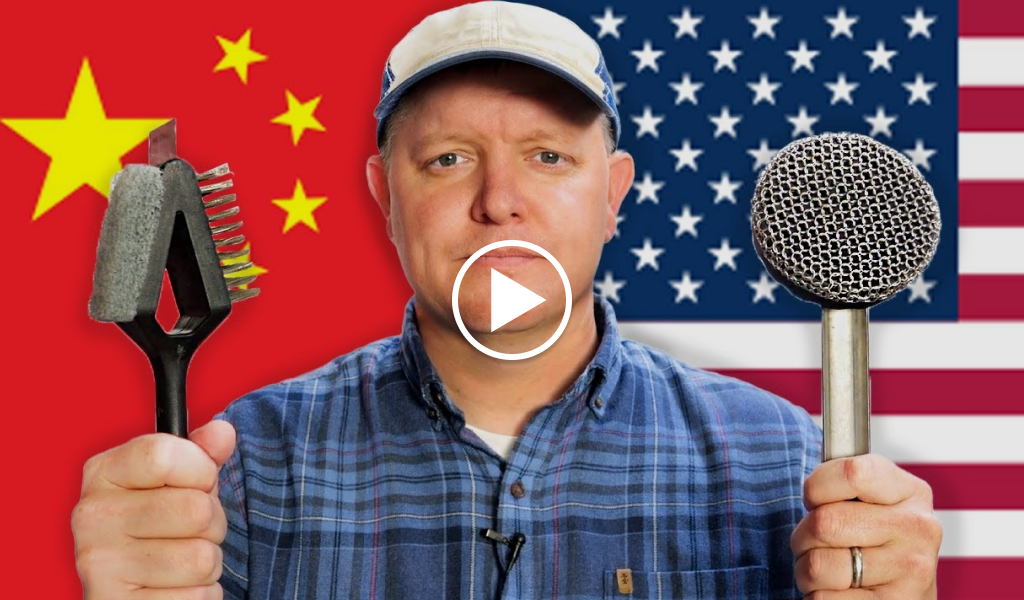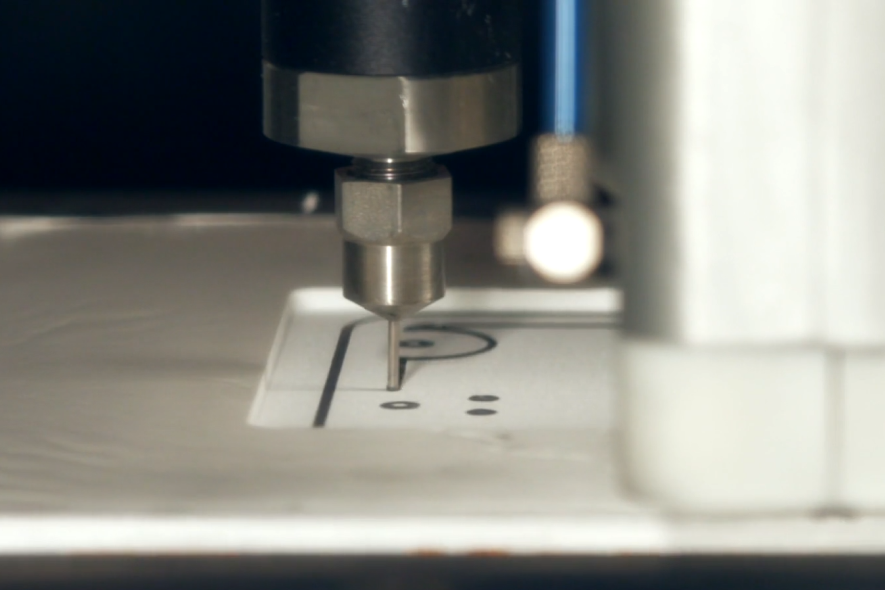AN OVERVIEW OF TOOL STEELS
Injection mold tooling utilizes a variety of different materials depending on the given application. Some tools may experience considerable heat, pressure, and abrasion during the molding process and must have a long lifetime to survive millions of mold cycles, while others are merely meant for prototyping or bridge tooling. Selecting the correct tooling material is crucial for delivering on the expectations of the function and lifetime. The best tools are ones that are designed for the specific application that the customer needs, and selecting the correct tool steels is a crucial first step in the process.
Listed below are some of the most common tool steels—P20, H13, S7, 420 stainless steel, D2, 4140, and copper alloys. Each material has its own advantages, disadvantages, and use cases, all of which are outlined in this guide.
1. P20 STEEL
P20 is a pre-hardened mold steel and is one of the first steels listed in any plastics engineering textbook because of its versatility and relatively easy processing ability. It’s part of the P-series mold steels, which are chromium-molybdenum-based low-carbon tool steels.
Pros:
- Versatility: can be used for a base, cavity, core, slides, etc.
- Machinability higher than many tool steels
- 65-75% of 160 Brinell B1112 steel
- Relatively low cost compared to other tool steels
- No heat treating required
Cons:
- Wear resistance lower than other tool steels
- Hardness lower than other common tool steels
- Short tool lifetime when molding highly abrasive, high-temperature plastics
Best Used For: Low to medium-volume production with plastics that don’t require high wear resistance.
P20 is the best tool steel for a first-iteration product, and it will likely be used with a mold that has 1-4 cavities, a single face, and a cold runner. The most common plastic materials molded in P20 would be polypropylene, polyethylene, and materials in those families.

2. H13 TOOL STEEL
H13 tool steel is a chromium-molybdenum-vanadium steel. It is the workhorse of the tooling industry. Known for its excellent toughness, wear resistance, and thermal fatigue resistance, H13 is commonly used for high-volume tooling and the molding of any abrasive plastics. H13 is a member of the H (Hot working) family of tool steels.
Pros:
- Excellent wear resistance
- Hardness
- 35 – 42 HRC typical
- 50 – 60 HRC after heat treatment
- H13 stays stable during constant temperature fluctuations, such as the heating and cooling during a mold cycle
- Ability to be polished
Cons:
- Higher cost
- Difficulty of machining
- 45% of 160 Brinell B1112 steel
- H13 rusts, requiring surface treatment and mold maintenance to maintain quality
Best Used For: High-volume molding of engineering, abrasive, or high-temperature plastics and tools that must endure high-temperature fluctuations.
H13 is the go-to steel for high-volume applications. It is the logical step up from a P20 or aluminum tool. If the tool is going to run millions of cycles or the part is made from a high-temperature or filled plastic, this is the correct steel to choose.
For a deeper dive into the properties and applications of H13 tool steel, explore our dedicated blog post on the topic.

3. S7 TOOL STEEL
S7 is a tool steel known for its unique combination of toughness, impact resistance, and high strength. It has the ability to fit both cold and hot work applications, making it a uniquely versatile steel. S7 is a member of the S (Shock resisting) family of tool steels.
Pros:
- Impact resistance
- Toughness
- Hardness
- 48 – 58 HRC typical
- Most commonly used at 54 – 56 HRC
- Can be polished to a very high surface finish
Cons:
- High cost
- Machinability
- 50% – 55% of 160 Brinell B1112 steel
Best Used For: Mold components requiring high impact resistance and durability, such as slides and large mold components.
S7 steel is best used for cavities, cores, slides, or other mold components requiring a great finish, impact resistance, and toughness. It is not a steel you would make an entire face or mold base out of, but it is a great option for components in a high-volume tool.
4. 420 STAINLESS STEEL
420 stainless steel is a martensitic stainless steel with great wear and corrosion resistance and top-notch polishability. Its ability to effectively add texturing and mirror finishing makes it a very good choice for a variety of high-value applications.
Pros:
- Corrosion resistance: once hardened it exhibits excellent corrosion resistance
- Polishability, texturing, etching, and mirror finishing
- Hardness and strength
Cons:
- High cost
- Machinability: More difficult to machine due to its high wear resistance and hardness.
- 45%-50% of 160 Brinell B1112 steel
Best Used For: Ideal for molds used in corrosive environments or for products requiring a high-quality surface finish.
420 stainless steel is a great choice for high-value applications like the medical industry, consumer electronics, and automotive markets. Due to its high cost, it is difficult to justify building every mold out of 420; however, it is often the best option when molding very corrosive materials or in lens applications.
5. COPPER ALLOYS
Copper alloys like beryllium copper exhibit superior thermal conductivity to the more common tool steels. These alloys are primarily used in the molding industry to reduce cycle times on high-volume tools.
Pros:
- Thermal conductivity: allows for much faster cycle times
- Surface finish: can be polished and textured
- Machinability
Cons:
- Low strength: does not exhibit the strength of tool steel
- High cost
Best Used For: Perfect for molds requiring fast heat transfer and high-quality surface finishes, such as those in the electronics industry.
Copper alloy cores are often seen in the industry on high-volume tools with very short cycle times. Because of the ease of machining, complex core designs can be achieved. This makes it a viable choice for a core on a high-volume tool where the thermal conductivity can be taken advantage of, but this is almost exclusively reserved for commodity-level plastics. Tools molding polypropylene and the family of polyethylenes are where you would most commonly see copper alloy inserts.
6. D2 TOOL STEEL
D2 tool steel is a high-carbon, high-chromium tool steel known for its high wear and abrasion resistance. D2 is a cold work steel, characterized by high stability and the resistance to deformation at high temperatures.
Pros:
- Wear resistance: Excellent wear resistance, suitable for high-wear applications.
- Hardness: It maintains its hardness up to a relatively high temperature.
- Stability: Offers good dimensional stability during heat treatment.
Cons:
- Toughness: Less toughness than other tool steels, making it prone to cracking under high stress.
- Machinability: More difficult to machine due to its high wear resistance and hardness.
- 27% of 160 Brinell B1112 steel
- Corrosion resistance: Lower corrosion resistance compared to stainless steel.
Best Used For: D2 is ideal for molds that require high wear resistance, particularly for processing abrasive materials. It’s less suitable for high-impact or high-temperature applications.
D2 is a great choice for many applications outside traditional injection mold tooling like dies, cutting tools, and punches. D2 would be reserved for high-wear applications like MIM or highly filled polymers for injection molding.
7. 4140 ALLOY STEEL
4140 alloy steel is a chromium-molybdenum medium-carbon steel that exhibits high toughness and good fatigue strength. With a good balance of wear resistance, strength, and toughness, this steel can be relatively versatile in its applications. Heating treatment is often required to achieve the properties desired for mold tools.
Pros:
- Versatility: Well-balanced properties make it suitable for a wide range of applications.
- Toughness and strength: Good combination of toughness and tensile strength, even when heat-treated.
- Cost is generally low.
- Machinability: Offers better machinability than many high-carbon or high-alloy steels.
- 66% of 160 Brinell B1112 steel
Cons:
- Heat treatment sensitivity: May require precise heat treatment to achieve desired properties.
- Wear resistance: Not as high in comparison to more specialized tool steels like D2.
- Corrosion resistance: Lower corrosion resistance compared to stainless steels like 420 SS.
- Very difficult to weld, making repairs slow and expensive.
Best Used For: 4140 alloy steel is ideal for molds that require a balance of strength, toughness, and wear resistance. It’s especially suitable for molds that do not encounter highly abrasive materials or extreme temperatures.
4140 Alloy Steel can be thought of as a competitor to P20, winning out in applications where impact resistance and cost are key drivers. However, P20 would be the better choice if the application requires a better surface finish or dimensional stability in high heat. For commodity plastics in low to medium volumes, 4140 can be a great alternative to P20 and a good way to cut down on the cost of a tool.
CONCLUSION: TOOL STEELS
The tool steel that you choose for each mold needs to be selected with great care and attention to detail. Spending the time upfront on the application development and understanding the exact expectations is crucial. P20, H13, S7, 420 SS, and copper alloys each have their place in the tooling world, with many pros and cons. Understanding each of these materials and the application of the tool allows the mold builder to ensure efficiency, durability, and cost-effectiveness for every one of their projects.
Here at Mantle, we utilize H13 and P20 tool steels, which have the properties needed for molding even the most demanding plastics. Our tool steels are compatible with existing shop operations, have the durability needed for volume production, and remain stable during standard toolmaking operations like machining and EDM. Read more about our tool steels here.

